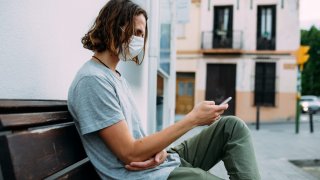
In a February survey of more than 100 immunologists, infectious-disease researchers and virologists, almost 90% said that SARS-Cov-2, the virus that causes Covid, will become endemic.
That means that there's a "constant presence and/or usual prevalence of a disease or infectious agent in a population within a geographic area," according to the Centers for Disease Control. Influenza, for example, is an endemic respiratory illness in the U.S., and there are four other endemic types of coronaviruses that cause the common cold.
Erica Ollmann Saphire, professor at the La Jolla Institute for Immunology, says she thinks Covid will be "a permanent part of the human existence."
Here's what that could mean for you.
Get top local stories in Southern California delivered to you every morning. Sign up for NBC LA's News Headlines newsletter.
Will endemic Covid be as severe or deadly?
To date, more than 500,000 Americans have died from Covid, with more than 28.3 million cases confirmed in the U.S.
If Covid becomes endemic, people will fare better as a whole, and not get as sick from the virus, Saphire says.
Money Report
When the coronavirus initially spread to the U.S., nobody was immune to it, creating "dry kindling for the fire," Saphire says. "Eventually, enough of us will be vaccinated or have survived it that there will be enough immune firebreaks that will slow propagation."
As people continue to get vaccinated, "infection levels are going to come down dramatically over the course of the spring and summer," Dr. Scott Gottlieb, former Food and Drug Administration commissioner, told CNBC's "Squawk Box" Thursday.
If Covid remains continuously spreading, it likely won't be as severe. Typically, you develop a stronger immune response with each subsequent infection.
"Maybe you don't get sick at all," Saphire says. "Maybe it's a sniffle." Several years from now, we can expect that enough adults are immune to Covid that only kids get it, she says.
In a recent study that modeled what living with Covid could be like based on other coronaviruses, researchers wrote: "[O]nce the endemic phase is reached and primary exposure is in childhood, SARS-CoV-2 may be no more virulent than the common cold."
That said, some people who have underlying conditions will still fare poorly from Covid, the same way that the cold or flu can lead to severe illness and death in certain populations.
How could endemic Covid affect daily life?
Covid could be another virus that we'll have to live with — but the social distancing and mask wearing to the degree that we currently won't be permanent.
Testing will likely become a normal aspect of our lives, with diagnostic tests becoming more accessible and cheaper options for at-home tests, Saphire says.
"I think it'll become part of our culture [for doctors] to say, do you have a [bacterial infection] or do you have a virus? You have a virus, is it a flu, or is it a coronavirus or is it something else?" she says.
To that end, we'll likely be better prepared to handle confirmed Covid cases because we know how it transmits and what behaviors can mitigate the spread.
Even by fall and winter this year, the U.S. will likely be "reaching a degree of normality," Dr. Anthony Fauci, White House Chief Medical Advisor, said on CNN's "State of the Union" Sunday. However, Fauci said that it's possible that we could be wearing masks into 2022.
"The vaccine is more effective than anyone expected, and it's going to make a big difference in our ability to return to some level of normalcy for society," Saphire says.
Will we need to get regular vaccines for Covid?
It's possible that annual single-dose coronavirus booster shots will become the norm, just like you get an annual flu shot. If the virus mutates, vaccines will need to be updated to handle variants.
"Maybe we will get better and designing vaccines that we can make more universal vaccines will help prevent some of our common cold coronaviruses," Saphire says.
Alex Gorsky, the CEO of Johnson & Johnson said that this could be the case for "the next several years," during CNBC's "Healthy Returns" on Feb. 9.
Check out: When Covid vaccines could be available at chain pharmacies such as CVS and Walgreens
Don't miss: The best credit cards for building credit of 2021






